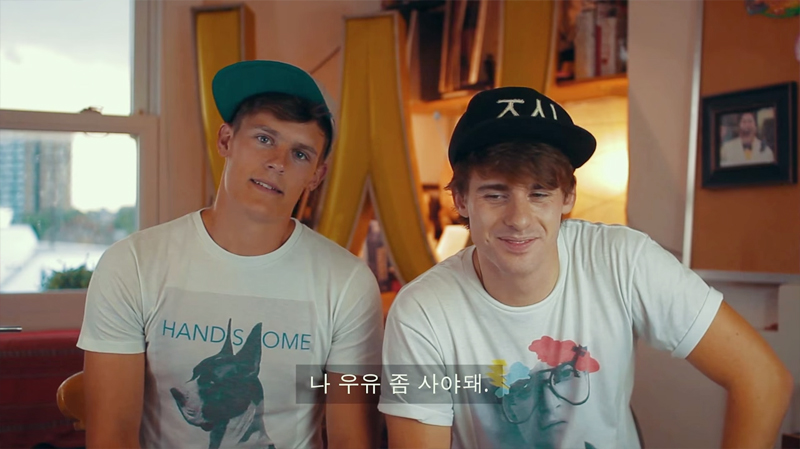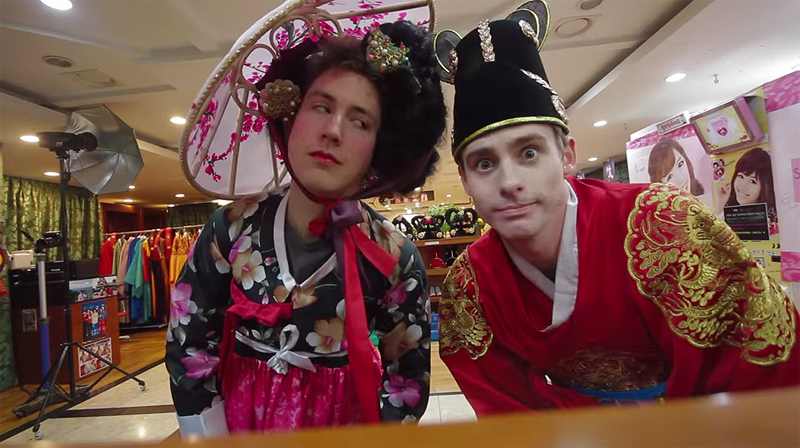- California Assembly OKs highest minimum wage in nation
- S. Korea unveils first graphic cigarette warnings
- US joins with South Korea, Japan in bid to deter North Korea
- LPGA golfer Chun In-gee finally back in action
- S. Korea won’t be top seed in final World Cup qualification round
- US men’s soccer misses 2nd straight Olympics
- US back on track in qualifying with 4-0 win over Guatemala
- High-intensity workout injuries spawn cottage industry
- CDC expands range of Zika mosquitoes into parts of Northeast
- Who knew? ‘The Walking Dead’ is helping families connect
Have you met Korean Englishman?

Ollie Kendal and Josh Carrott eat spicy Korean noodles in a video featuring Londoners’ reactions to the food. (YouTube screen capture)
By Tae Hong
When a couple of white guys go around the streets of London introducing Korean culture to puzzled/delighted/clueless locals, people are bound to notice.
That’s exactly what Josh Carrott, 25, and Ollie Kendal, 26 — better known as Korean Englishman on YouTube — have been doing for a year.
“I’m Korean Englishman,” Carrott explains in Korean, sitting inside his London apartment in the channel’s introduction video. “I love Korea, but I love England too. I had a lot of good experiences in Korea, and I want to show my friends there the England that I love.”
What’s surprising about Korean Englishman isn’t so much that they’ve amassed more than 455,000 subscribers and over 17 million views — hefty numbers by any means — as much as the fact that all the videos are wholly filmed or subtitled in Korean.
It’s hard to deny it: Global interest in Korea has spiked over the last few years (it would be impossible to bypass the now-obligatory mention of Psy’s explosive “Gangnam Style”), and along with it not just attention on K-pop and Korean dramas, but also the country itself.
It’s Korea — not just the pop, but its quirks and oddities and traditions — the Korean Englishman duo looks to teach their home country and, as they continue, the rest of the world.
For Carrott, the term “home country” may raise a bit of an identity crisis, the sort that drove him to create the channel in an effort to link what are, to him, two equally important cultures.
“Culturally, I’m kind of messed up,” he said. “I have no idea where I’m from.”
He was 12 when his parents’ jobs took the Carrott family from England to the seaside city of Qingdao, China, which boasts the largest Korean population in China after Beijing. Soon, he was enrolled in an international school; he wouldn’t go back to London until college.
“I was uprooted,” he recalled. “[Qingdao] was a mini-sub-culture of Korea within China. My entire exposure, really, was all Korean culture.”
Everyone there spoke Korean amongst themselves; everyone there was Korean. They went to Korean restaurants and played video games at PC rooms. Carrott, an outsider who was in the process of adjusting to it all, remembers his first experience at a Korean karaoke.
“As an English 13-year-old, you’re like, ‘Why the heck are they singing love ballads to themselves? There’s no girls here, just a bunch of guys singing love ballads in a tiny little dark room in China. What is going on? I’m confused,’” he laughed. “I’ve just learned to love it. By the time I graduated, I felt like I couldn’t imagine my life without interactions with Koreans and without Korean friends for the rest of my life. … I felt like I was culturally as Korean as I was English.”
In college, Carrott studied the Korean language for the first time and studied abroad in Seoul during his second year. He’s now a near-fluent speaker, a skill displayed in the videos.
Kendal, a buddy from college and who was introduced to Korean culture through what he calls “forced exposure” from Carrott, has a background in video-making, photography and graphic design.
A year ago, Kendal was busy pursuing a master’s degree in biblical studies at King’s College; Carrott had a full-time job in sales at a language school. Still, the friends decided they wanted to produce 10 initial episodes using a free summer.
Korean Englishman is, in a way, what Carrott uses to show everyone, including those close to him, who he is as a person.
“The whole idea behind this channel was, we love English culture, we love Korean culture. We loved doing something linking the two,” Carrott said. “We loved introducing English culture to Koreans, Korean culture to English people.”
The platform? YouTube, the omnipresent video site they had spent hours and hours browsing during their college years. If the response was good, if they could gain 30,000 subscribers over the course of a year, the project would keep going, they decided.
The videos, of course, took off. In less than five days, the first video had reached 100,000 views. Carrott and Kendal were shocked.
“When it happened it was like, ‘Holy moly. What are we going to do now?’” Carrott said.
“Korea has so much to offer the world,” Kendal, who is now working part-time at a homelessness charity and his master’s thesis while filming Korean Englishman, said. “I think we’re simply one of many people who are Westerners who are interested in Korean culture. If we can be a part of the process of normalizing that, I think that would be a good thing.”

Josh Carrott, right, teaches London slang to Koreans with his close friend Joel. (YouTube screen capture)
Tours of London, interviews with locals trying Korean snacks and showing children K-pop idol acts like EXO and 2NE1 litter the channel’s content. It’s now time for the team to explore new territory, especially as they arrived in Los Angeles to attend KCON 2014 as a part of CJ E&M’s Creator Group and also for a two-week road trip to New York, during which three episodes will be filmed.
They’re all ready to go — Joel, a close friend who’s a regular face on the channel, will drive; they’ve got two boxes of notoriously mouth-burning noodles, booldak bokeum myun, to be introduced to Americans on their path; the car will be decked out with Korean flags.
“We’re going to stop at places and talk to people about Korea,” Kendal said. “It’s going to be a diplomatic mission.”
“We just want to break down some boundaries,” Carrott said. “There’s been a great leap in the last couple of years of K-pop culture becoming ‘the thing.’ It’s totally normal now. When you talk about K-pop, everyone knows what you’re saying [about K-pop and K-dramas]. So we’re going to leave that to the rest of the Internet. What we love about Korea goes a little deeper, I think, or at least not so bound up on online culture.”
Kendal agreed.
“Sure, K-pop and K-dramas is a part of that, but there’s so much more than that. Part of what we do is go around London talking about places that we think Koreans and our Korean friends would like,” he said. “I think what’s important to us is that what we represent is sincerely Korean. We don’t want to represent a Western idea of what Korea should be, or a Westernized, sanitized Korea. We want to represent a Korea that Koreans are proud of.”



















Kim
August 16, 2014 at 7:33 PM
Interesting article. As a Korean (American), I find it ia huge compliment when non-Koreans are interested in learning our language and our culture. When I first saw their video, I was completely blown away by how well he spoke the language and then learning that he’s only lived in Seoul for about a year.
It looks like these Englishmen are on the rise of huge success and I wish them luck in their endeavors. I look forward to seeing more of their work.
Sarah
August 19, 2014 at 7:58 AM
I really wish Koreans would be less patronizing about foreigners speaking Korean. It’s not an impossible language to learn. Non-Koreans speaking Korean is no different to Koreans born and raised abroad learning the language. I’m sure many Koreans would find it patronizing to be told how amazing it is that they can speak English. You don’t have to be in the country to study the language or even to learn to speak it well although it obviously provides more opportunities to use the language daily.
Yes, these videos are good, but is it really necessary to comment – and so early in the article, too! – that it’s surprising the videos are in Korean? Why is it surprising that many English speakers study and speak other languages? You wouldn’t pat a foreign-born Korean person on the head and compliment them on speaking Korean, so please don’t do it to non-Korean people either. We’re all just people.
Jenny
August 24, 2014 at 7:56 AM
I think it’s interesting to Koreans in this particular instance because he’s lived in Korea for such a short amount of time and the resulting fairly advanced level of the Korean that he possesses is quite impressive. Korea is such a small country and Korean is in no way nearly as used as English is worldwide so any foreigner taking interest to learn our language (especially while not living in the country) is nice to see in our eyes.
So if you think that’s patronising (meaning showing interest in a condescending or insincere manner) then that’s really reflected back on you. Majority of the Koreans (note I said “majority) don’t mean it in that way. We are seeing more and more interest in our country/culture from foreigners than there used to be than say, a decade ago so this is all somewhat new and exciting for some of us, that’s all.
yolande
September 18, 2014 at 10:03 AM
Carrott’s videos are very interesting and helful. He has introduced both Korean and British cultures. To two countries’s people, it’s an great opportunity to understand each other. In addition, he sometimes teach English for Korean people who want to learn English conversation.
I’ve never been to London, but I really hope to visit there. After I saw his videos, my mind was filled with England.
Patrick
January 25, 2015 at 9:43 PM
Sarah, I’m going to assume that you’re a white westerner because of your comments, if I’m wrong I’m sorry but your comments scream American white girl. You have to realize that the Korean persons amazment of foreigners learning the language and culture isn’t patronizing it comes from endearment. When you’re a white person on this earth the whole world is open to you and your view of how things are and how they should be differ greatly from every other person from a, I’m going to say “colored” heritage. As a Korean who grew up in America from the age of 2 during the 80′s and 90′s, pretty much anything you know or have seen of Korean culture today would be unheard of during that time. While living in apartments we would be afraid and embarrassed to cook the stews and cook the stinky oily fish we love to eat with our stinky kimchi because we thought our neighbors would be cursing us. I know people who still cook their food in their garage to this day because they’re afraid the smell of korean food will ruin the resale value of their home because they think white people don’t understand. Top chef’s weren’t making their own kimchi and incorporating it into dishes. Kimchi and Korean food was made in small restaurants by Korean people for only the korean people who went to eat there. Now you see a quarter of a Korean restaurant is non Korean. We and other people from cultures outside of America were made to feel ashamed. Judging by your comments you have no idea where we’re coming from. I’m not even going to get into the racism I’ve experienced. But through all of those things seeing people becoming more and more interested in Korea and it’s culture is very endearing because honestly, we love our culture but we’ve gone through life thinking nobody else really gives a shit. The fact that people would tell me kimchi smells like shit when I was a kid and now it’s in a lot of mainstream American restaurants is weird in a good way. So before you tell people how they should feel based on your upbringing and experiences, try finding out why other people feel the way they do first, try to understand where other people are coming from.
HEC
October 22, 2015 at 8:49 AM
Amazing, absolutely amazing!
I started watching Korean Englishman’s videos a while ago and I found myself enjoying watching non-Koreans experience Korean culture (especially the food). It was hilarious when comparisons became very descriptive. I was soon curious about the you-tuber behind it all (or rather in the middle of it all), Josh Carrott. So I googled him and now I am here.
I usually keep simple opinions like these to myself, but what really made me comment was how rather alike Carrott and I were- *background wise*. I consider myself a Korean American. However, it’s not as simple as that. I was born in Tianjin, China; my family had moved because of my dad’s job. I attended an international school which was infested with Koreans- a whole community of them, much like what Carrott experienced. I was never a part of this community nor the Chinese community. In fact I have and have had very few Korean friends.
After I graduating elementary school we moved again to the U.S.
One major difference is that while Carrott lived his earlier childhood in England and then moved to China. My life story began as a “foreigner” in China and I was already culturally Korean.
“Culturally, I’m kind of messed up, I have no idea where I’m from.” -Josh Carrott
This quote so accurately applies to myself that I am blown away, it follows me everywhere I go.
Pingback: Youtube Englishman In New York Karaoke | taxi - newyork transportation
Pingback: Beast Idol Maid Ep 12 Eng Sub | teams - housekeeping co
Kay
January 14, 2016 at 12:49 AM
Sarah and Patrick, I understand where both of you are coming from. I think Patrick laid out eloquently where he’s coming from. I get it. I also see where Sarah s coming from. How would you feel if your parents keep telling you “good boy!” for every little things and treat you like a two year old when you are 30. I think you both made good points, and by now, I think by now, Korea could get more used to seeing nonKoreans becoming more familiar with Korean culture and language.
Jude Rowlands
January 14, 2018 at 8:33 PM
I usually keep simple opinions like these to myself, but what really made me comment was how rather alike Carrott and I were- *background wise*. I consider myself a Korean American. However, it’s not as simple as that. I was born in Tianjin, China; my family had moved because of my dad’s job.